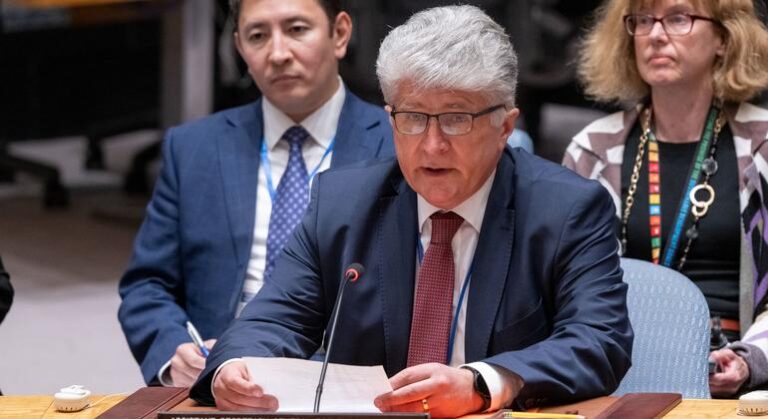Miroslav Jenča, UN Assistant Secretary-General for Europe, Central Asia and the Americas, Political and Peacebuilding Issues and Peace Operations, provided an update on recent developments since the Secretariat’s last Council briefing in July. provided.
The country continues to grapple with problems stemming from a brutal war that killed 100,000 people across the former Yugoslavia in the early 1990s, including the Srebrenica massacre in which 8,000 men and boys died.
The war ended with the 1995 Dayton Peace Accords, which established Bosnia and Herzegovina, Croatia, and Serbia as separate United Nations member states.
“Bosnia and Herzegovina’s political leaders agree that European integration is the best path to ensuring the country’s future stability and prosperity,” he said.
“A once-in-a-lifetime opportunity” to bridge the gap
Mr. Jenča referred to the European Council’s decision to start accession negotiations with Bosnia and Herzegovina in March this year, based on the Commission’s assessment of Bosnia and Herzegovina’s progress in major legislative and judicial reforms.
“The European project presented a unique opportunity for the continent to bridge the divide. shaping a stable and prosperous future despite ongoing challenges,” the Assistant Secretary-General explained.
He said that based on a united commitment to a stable and peaceful future, the Bosnia and Herzegovina Council of Ministers at the end of 2022 will seek UN support through the Peacebuilding Fund. Strengthening social cohesion, respecting diversity, understanding and trustEspecially among young men and women from different communities.
Initiatives supported by the Peacebuilding Fund have begun to be implemented.said Gencha, noting that ongoing efforts are being carried out in close collaboration with authorities and local communities at all levels across the country.
“These projects focus on women, peace and security, youth, the peace and security agenda, and the implementation of community dialogue,” he said.
Hate speech, genocide denial
At the same time, actions and statements have emerged in recent months that contradict these positive developments, he said, noting concerns raised by the Special Assistant to the Secretary-General on the Prevention of Genocide.
He said that his special assistant, who has been on official visits to Bosnia and Herzegovina and the region over the past few years, has raised the following concerns: Repeated separatist threats, promotion of hate speech, denial of genocide and glorification of war criminals those convicted in local and international courts;
Additionally, the Special Adviser said he recently issued a statement on the dangers of these trends and their long-term implications for peace and reconciliation in the country, underscoring the importance of addressing the legacies of the past, including genocide and crimes. humanity and war crimes.

A government soldier reads out the names of survivors or fugitives identified from the fallen city of Srebrenica in 1995. (File)
Lasting peace is rooted in understanding the past
He said the International Criminal Tribunal for the former Yugoslavia and the International Court of Justice (ICJ) had determined that acts of genocide against Muslims in Bosnia and Herzegovina had been committed in and around Srebrenica in July 1995.
“Only by promoting understanding of the past Addressing the root causes and continuing impact of such violence on society through truth-seeking and accountability, Is sustainable peace possible?,” He said.
Noting that the Secretary-General has consistently called on everyone in the region and beyond to counter hate speech, rhetoric of division, and discourses of distrust and fear, he urges all communities, all leaders, He reiterated the UN Secretary-General’s message that all organizations, including the UN, will work together. The media must commit to this.

Zenica city in central Bosnia and Herzegovina. (File)
“Remarkable” efforts to promote reconciliation
“For decades, many people in Bosnia and Herzegovina have undertaken remarkable work to promote trust and reconciliation in the country,” he said.
But he added: Helping society as a whole deal constructively with the past is the primary responsibility of authorities and institutions at all levels.to show respect to all victims and survivors, and to work towards a prosperous and peaceful future for all Bosnia and Herzegovina.
Recalling that the United Nations is neither a signatory to the Dayton Peace Agreement nor a member of the steering committee of the Peace Implementation Council, the United Nations said: remains committed to supporting Bosnia and Herzegovina on its path towards reconciliation, peacebuilding and sustainable development.”.
Also briefed on the board were Želica Cvijanovic of Bosnia and Herzegovina and Christian Schmidt, the country’s high representative to the United Nations, created to oversee the implementation of the civilian aspects of the Dayton Peace Agreement that ended the war. Ta.
For a complete overview of this and other meetings of major UN bodies, please see our coverage of UN conferences. English and French.

